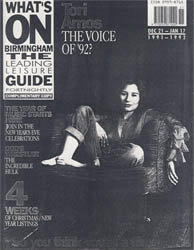|

songs | interviews | photos | tours | boots | press releases | timeline
What's On (Birmingham) (UK)
December 21, 1991

BREAKING THE SILENCE
Mike Davies takes the seismograph to Tori Amos.
She's been spoken of in the same breath as Joni Mitchell but a more accurate comparison for Tori Amos, the copper-haired 28 year old daughter of a North Carolina Methodist minister and potentially most exciting female singer-songwriter of the '90s, would be a cross between Janis Ian and Kate Bush. Not only does Amos play piano, but the voice and lyrical concerns conjure up parallels to both Bush's Hounds of Love and Ian's Between the Lines. Indeed, although narratively different, Silent All These Years with its immortal line 'I got the anti-Christ in the kitchen yellin' at me', is a 90s equivalent of At Seventeen's tale of teenage confusion and alienation.
Given that Tori - who names herself after a species of pine and cites Bartok and Lennon as twin heroes - began songwriting and playing piano at 2 ½, the word 'prodigy' comes to mind. And, like most prodigies, it's not been a smooth ride. At five she entered Baltimore's prestigious Peabody Conservatory. The plan was for her to become a concert pianist, but it was neither a future nor a discipline for which she cared.
"I was six and suddenly I was told there was a right and wrong way to play. For me, religion was about right and wrong. Methodism teaches you to restrict your emotions, music was my outlet. And when that freedom of expression became restricted it stopped being fun. The decision that I didn't want to do what was expected of me kicked in when I was seven. And the Conservatory kicked me out when I was 11."
Enter Tori Amos, moodily introspective rebel.
"I'd always been Mary Poppins with dirty panties but instead of terrorising others, I terrorised myself. I turned my anger inwards and sat in a corner, bored out of my mind."
So bored and broken by the experience that she stopped playing, regarding herself as a failure at 13. With rare parental understanding, dad suggested she start performing. He even took her to her first gigs at a Washington gay bar.
"My folks weren't opposed to a music career, just the opposite. But the stage was my area, my world and once I got off that piano stool I retreated into myself again."
Faced with the conflicting facets of home and the world experienced in her gigging life, Amos's psyche began to fragment into split personalities to handle things. Almost inevitably the familiar teenage problems of reconciling love and lust - subjects that get the poignant Amos treatment on China and Leather - were compounded by her religious background.
"You can't argue with the basics of what Jesus said but they were tampered with to manipulate people. The whole Christian church is about keeping women subservient. If you're not Mary the Virgin, you're no good. I'd ask my dad, 'If Jesus did it with Mary Magdalene would that make what he taught any less valid?' And he'd go on about my disrespect. Because Jesus maybe had a sexual encounter with a woman, did that make him less? Was he soiled by it and what does that say about women? Consequently, until a few years ago, music was the only ground for me where love and lust happened!"
At 21, Amos moved to Los Angeles and released a debut album. It vanished but the move itself was to prove crucial to career and psyche. Now among people with whom she had no past, under less pressure to be approved of, it was the beginning of a long, painful process to re-integrate herself with the world. Significantly her painful, poignant album of self-flagellatory but not self-pitying songs is called Little Earthquakes. Everything on it, she says, was written following a trauma some four years ago, a reference perhaps to the rape she sings about on the starkly cauterising Me and a Gun.
Whatever the spur, the dam broke and out flooded long repressed emotions. Winter ('when you going to love you as much as I do?') and Crucify ('everyday I crucify myself') are prime portraits of self-loathing.
"I didn't feel worthy of love. But there's also that element of enjoying the suffering. Some people enjoy suffering, some enjoy implementing it and there's the third type who want both. Where would the abuser be if the victim didn't provide the whips? I look back and see I chose to be a victim. I relinquished my power by needing validation from others."
Girl ('she's been everybody else's girl, maybe one day she'll be her own') is about the search for self-identity.
"It's about not listening to yourself but to everyone's ideas of how you should be as a person. You have to be able to know yourself, to accept what you did, otherwise you end up wearing their opinions like jumpers."
The exorcisms of Little Earthquakes are a step towards choosing her own clothes.
"There has to be a healing process, the ability to laugh at the end of the day. You can crawl inside your pain, it doesn't have to be all throw up. Sometimes I feel uncomfortable, sometimes I defy people, but my strtength is that I can crawl inside my heart. I'm becoming aware of why I feel what I feel. That doesn't mean I'm at peace, but I can accept the turbulence. I'm learning to be a free agent, not other people's victim."
Little Earthquakes is released on January 13 on EastWest Records.
t o r i p h o r i a
tori amos digital archive
yessaid.com
|